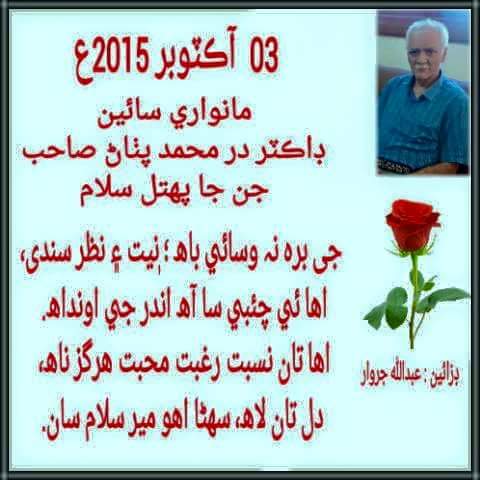Karachi, 15th October 1913
. To,
HIS EXCELLENCY SIR HUGH DOW, K.C.S.I, C.I.E, I.C.S,
GOVERNOR OF SIND,
KARACHI.
MAY IT PLEASE YOUR EXCELLENCY,
The humble petition of the Karachi Bar
Association respectfully submitteth for
your Excellency's consideration, as under:
1. The Karachi Bar Association is a body which is open to all members of the Bar in the Province of Sind.
2. It is a term of the license to practise that every member of the Bar practising at Karachi shall be a member of the Karachi Bar Association. This Association is therefore fully representative of the members of the Bar practising at Karachi and is open to every legal practitioner in the Province.
3. It has come to the notice of the Karachi Bar Association that the present Advocate General of the Province, is going out of office with the expiry of the current month and it is rumoured that your Excellency is appointing Mr. Hassanally Agha (who is at present holding the office of the District and Sessions Judge for the District of Sukkur) as the next Advocate General for the Province.
4. In this connection the Karachi Bar Association have resolved that a representation be submitted to your Excellency and in con-sequence of that resolution the present representation is being so submitted.
5. The Office of the Advocate General for any of the Provinces in India was created by Parliament under the Government of India Act of 1858 and the Parliament there provided that each of the three Presidency Towns of Calcutta, Madras and Bombay, shall have an Advocate General whose appointment was to be made by Her Majesty under Her Royal Sign Manual.
6. Since 1858 until 1st April 1937 when the Government of India Act of 1935 came into operation, there continued to be in existence, the three Advocates General for the three places referred to above. The Advocate General for Bengal at Calcutta was and continued to be the Legal Adviser to the Government of India until 1937.
7. During all this long period, none but a practicing member of the Bar was ever appointed to the office of the Advocate General.
8. The Joint Parliamentary Committee appointed by the Parliament to go into the question of Indian Reforms in their report recommended :
"We have been impressed with the desirability of making available to each Provincial Government the services of a Law Officer of independence and standing who would occupy substantially the same position as that of the Advocate General at present attached to the Governments of the three Presidencies of Bengal, Madras and Bombay."
9. It may further be noted that the Joint Parliamentary Committee pointed out "that the Advocate General in each Province may take on behalf of His Majesty such proceedings as may be taken by His Majesty's Attorney General in England."
10. When the Parliament in enacting Section 55 of the Government of India Act created the office of Advocate General for each of the Provinces, it accepted the recommendation of the Joint Parliamentary Committee and it may therefore safely be said that the position of the Advocates General in all the Provinces in India was what it had all along since 1858 been in the three Presidency Towns and that it was like that of the Attorney General in England.
11. The functions which an Advocate General of a Province has to discharge have very close resemblance to those of the important functions which the Attorney General and the Solicitor General in England have to discharge.
12. Dealing with the question of the functions of the Advocate General it may be submitted for your Excellency's consideration that the Advocate General does not merely give advice to the Provincial Government upon such legal. matters and perform such other duties of legal character as may from time to time be referred or assigned to him by the Governor of the Province; these are his duties statutorily provided under the Government of India Act, 1935. In addition to those the Advocate General occupies a distinct position as the Leader of the Bar. The Indian Bar Councils Act XXXVIII of 1926 expressly recognizes it and in Section 4 provides that the Advocates General of Bengal, Madras and Bombay shall be the Chairmen Ex-Officio, respectively, of the Bar Councils constituted for the High Courts of Judicature at Fort William in Bengal, Madras and Bombay. Elsewhere he is ex-officio member of the Bar Council and in the case of our Association he is also an ex-officio member of the Managing Committee of the Karachi Bar Association. It may be mentioned that at the date of enactment of the Indian Bar Councils Act, there was no Advocate General at any place in India, other than the three Presidency towns.
13. The Advocate General as the Leader of the Bar has certain statutory rights under the Indian Bar Councils Act which have an important bearing in relation to the conduct of the members of the profession. The Civil and Criminal Procedure Codes give to the Advocate General certain statutory rights and powers. The Sind Courts Act (Bombay Act VII of 196) also gives to the Advocate General certain statutory powers under Section 13. These are some of the statutory powers which the Advocate General has. In relation to all these and several others, the intention of the Legislature would seem to have been that the Advocate General should be a practising member of the Bar with requisite knowledge and experience.
14. The Advocate General has to lead and guide the Bar in matters of privileges affecting the profession. He is besides to he a person well versed in Constitutional Law able to assist the Legislative Assembly. Parliament has given him the power to attend all meetings of the Assembly, take part in its debates, and be named as a member of its Committees. In the words of the Joint Parliamentary Committee "he should be a Law Officer of independence and standing" in whose hands the rights and privileges of the legal profession and of the public at large could be safely entrusted.
15. It is respectfully submitted for your Excellency's consideration that a Government servant cannot be appointed to the post of the Advocate General. Your petitioners also submit for your Excellency's consideration that the Parliament has made its intention—in regard to the office of Advocate General very clear in Section 55 of the Constitution Act. That Section enables your Excellency to fix the "remuneration" of the Advocate General, in your individual judgment. The word "remuneration" is not synonymous with salary. The Constitution Act uses the word in contra distinction to "salary" used elsewhere in the Pict itself. The word "remuneration" within the Section will not cover "salary of the Government servant with right to pension. Your petitioners understand that the appointment is intended to be made on the basis of a fixed salary for the new Advocate General with right to pension earned during the term of office. This, it is submitted, would not be legal_ Nor can a Government servant with fixity of tenure be said to hold the office during the pleasure of your Excellency as the Statute provides.
16. Under the circumstances your Excellency is requested to consider if your Excellency in the exercise of your individual judgment would appoint a salaried servant of the Government to the office of the Advocate General even if such an appointment could be made.
17. Your Excellency may also be pleased to consider that Mr. Hassanally Agha (who, it is rumoured is being appointed) is not qualified to hold the office of the Advocate General of Sind on account of his standing at the Bar. Mr. Hassanally Agha became entitled to practise in the Court of the Judicial Commissioner of Sind by reason of
the Sanad issued to him on 20th December 1926. He has not had 10 years standing at the Bar which alone, it is submitted, will qualify him for the office of the Advocate General. His tenure of office as a Judicial Officer may or may not have qualified him for the post of a Judge of a High Court but it has not qualified him for the post of the Advocate General. He entered Government service as an Assistant judge in 1931 and ever since he has held office under the Crown in the Judicial Department.
18. For these reasons, your Excellency is requested to consider this representation before your Excellency makes the appointment in succession to the present Advocate General and to determine if a salaried servant of the Crown call at all be appointed or continued as a salaried servant in the office of Advocate General and even if he can be appointed or so continued, whether your Excellency would create a precedent in so appointing a salaried servant of the Crown to the office of the Advocate General.
19. Your Excellency is well aware that India has been advised that Constitution grows by conventions.
Under the circumstances your Excellency is requested to consider if in the exercise of your individual judgment, you will deviate from the hitherto well settled and healthy practice of appointing the Advocate General from among the practising members of the Bar ; To appoint a salaried servant of the Crown as Advocate General and while holding that office to continue him as a salaried servant of the Crown, would, in the humble submission of your petitioners, not only be a departure from the healthy practice of very long standing but also contravene the provisions of Section 55 of the Constitution Act.
Your petitioners therefore humbly pray that your Excellency do appoint none but a practising member of the legal profession in the Province to the office of Advocate General for Sind.
I beg to remain,
Your Excellency's
Most obedient servant,
FATEHCHAND ASSUDOMAL,
President,
Karachi Bar Association.



